Sun, 19 December 2021
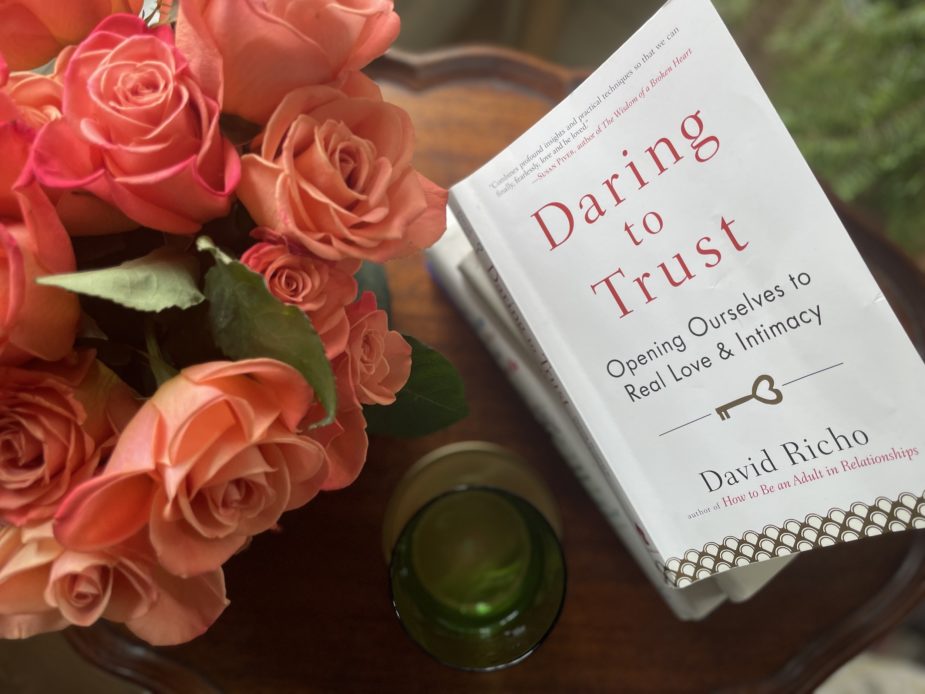 "As we practice unconditional trustworthiness, we notice a healing result: we are no longer devastated when others fail us. Our focus has shifted from ourselves as victims of others' betrayals of fidelity to our own commitment to trustworthiness. We still see that some people are not trustworthy, and we feel sad and injured. But as long as we do not follow suit, we are not so hurt as we once were—and we like ourselves more. This does not mean that we have become naive or gullible. It actually shows that we trust ourselves more. Then we become more discriminating in recognizing trustworthiness in others." —David Richo, author of Daring to Trust: Opening Ourselves to Real Love & Intimacy Often the word trust is expressed as a fundamental desire to find in other people, but what often is forgotten is how we play a role in both being fully trustworthy, but also trusting ourselves. Having self-trust, David Richo shares in his book Daring to Trust is one of the four types of trust we must possess in order to live a deeply enriching and fulfilling life. What are the other three types of trust you may be wondering? We will talk about those in today's post/episode. Over the course of this podcast, I have shared many discoveries from a vast range of books on how to improve the skills that will improve the quality of our lives (see the list of the most recent, the past two years, below). I found it especially poignant and timely that I read Daring to Trust as the year 2021 wound down.
Often we aren't certain or cannot pinpoint what exactly is preventing us from living a life of true contentment. Perhaps we have come quite close, have felt it from time to time, but not consistently. There are moments of deep fulfillment and peace, but it eludes us at other times, and we wonder what we have done wrong. For me, after reading the following books listed above (link to the episode each book inspired), I felt confident I had the ingredients to live a life of everyday contentment, and largely I did, but the said contentment would flit away when certain moments would present themselves, and so I kept searching. I told myself, there must be a missing ingredient I have overlooked. I must have missed a crucial skill for holding myself steadily in contentment each day. Turns out it was understanding what true trust is and how to be fully trustworthy all the while acknowledging that we (and others) are human. Both of these concepts are what will be discussed in today's episode/post. First, let's find common ground on what trust is. David Richo defines it simply as reliance on reliability. He underscores, "[Trust] is not dependency but rather an inner assurance, a confidence that gives us a sense of security." 1. Strengthen your trust IQ: Know when to walk away "We trust others when we feel safe and secure in their presence. Our insistence that we will spend time only with those with whom we feel safe increases our trust IQ. Over time, we become more adept at telling the difference between a con artist and a straight-up guy. When we feel unsafe with someone and still stay with them, we damage our ability to discern trustworthiness in those we will meet in the future." Understanding true trust in others and exercising trustworthiness in how we live our lives gives us the tools to know when to stay and when to leave. Richo's quote above brings to our attention the importance of how we hurt this skill of discernment each time we distrust what we know about trust.
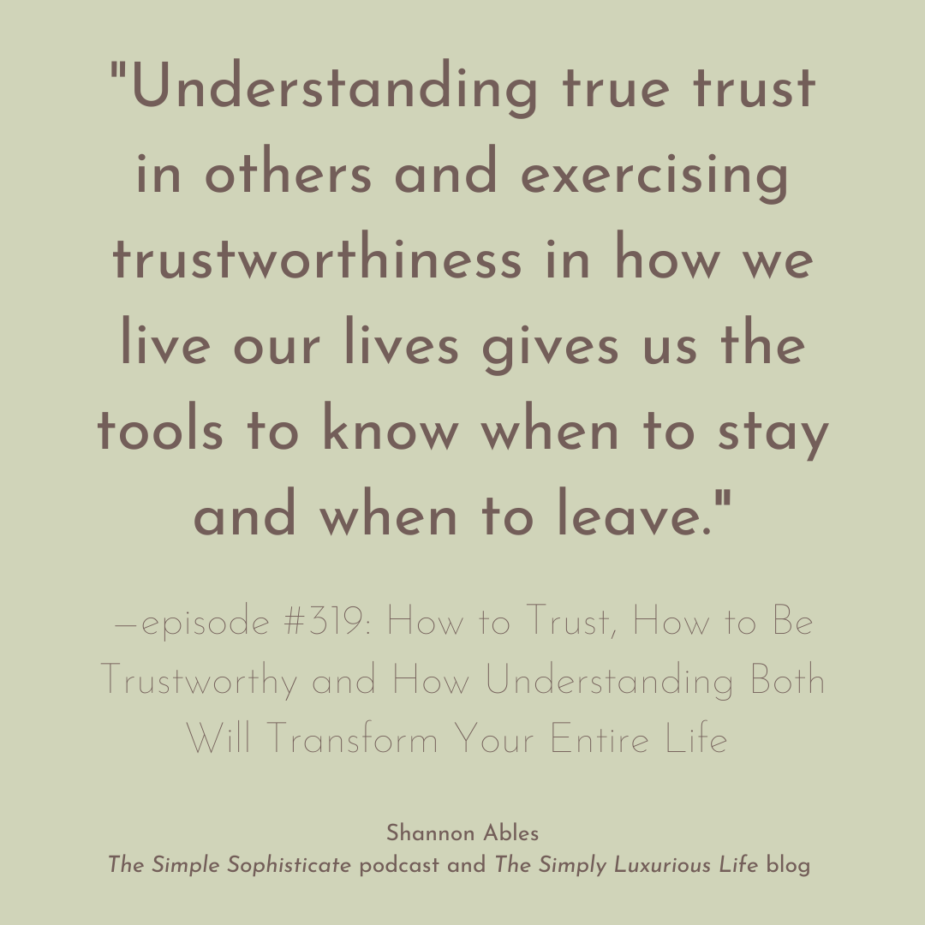 When we know we can trust, "we know longer have to protect ourselves" and the cultivation of true intimacy becomes possible. But first, what is adult trust? In other words, what is the trust we need to understand? 2. What is trust, adult trust? When I read the first chapter of David Richo's book I became immediately aware of how I had approached trust incorrectly throughout my adult life. I had placed the responsibility on the other to show trust or to be trustworthy, placing the power in someone else; however, I had it backwards and I disempowered myself in the process. Let me explain: Adult trust is "I trust myself with whatever you do" instead of "You will never hurt me." Sounds crazy to choose to let go of the latter statement, but again, you are taking back your power, taking responsibility for being trustworthy and being able to accurately determine if someone is available to be trusted. Richo points out that when we make this shift to adult trust, we remove the victim mentality and own our life, our choices and honor ourselves which improves our ability to observe those who are capable of being trusted as we move forward. By putting the trust in ourselves to discern if others are trustworthy, knowing we can walk away at the worst of it, speak up with assertiveness (not aggression) we exhibit security in ourselves. And when we demonstrate we are a secure individual, we attract healthier individuals to us as we are not seen as a burden to someone else, not seen as a victim in need of someone else's care. 3. True trust takes time As much as we desire to flat out trust the person who captures our eye, our libido, our hopes, to say we fully trust someone so quickly is foolhardy. In fact, we must count ourselves fortunate if we grew up in a family home where a healthy installation of trust as Richo calls it was part of our upbringing because we will know what true trust looks and feels like in others as we navigate into our adult lives. However, if such a childhood was not part of our life story, it is important to learn what true trust is so that we will begin to seek out those we can trust and let go of those we cannot. We forget that as a baby, our whole lives were placed in the responsibility and care of adults we didn't get to choose. Over the course of our childhood - 18 years or so - we either have a mountain of evidence that our parents were trustworthy to provide security and care or we don't, but it took time, and our parents were not perfect, so they made mistakes, but most likely, they are people you could trust. The imperfection is important to note, as is the time factor. Trust takes time. No matter how attracted you are to someone, no matter how hotly charged the chemistry that runs between you two, neither have anything to do with whether or not you can trust them. You may want to trust them, but you do not have enough experience with them, time with them or exploration of them to know whether you can or not. What does taking time to trust look like?
"Our companion practice of the unconditional yes to what is directs us to be thankful for trustworthiness from others when it comes our way and be open to disappointment sometimes too." 4. Often sex is desired when it is trust we seek "Regarding touching, it is central to trusting." While there are the five languages of love as Gary Chapman talks about in his book which was the central focus of episode #87 - Romantic Love: What is it and How to Maintain It, touch is often something each of us is starved for. Healthy touch, loving touch, a safe touch. Richo brings to our attention that "in adulthood we may look to sex as a substitute for the touch and holding we need" when what we are actually seeking is a heart connection which can happen in many other ways of touching. However, because we know that other forms of touching prompt great emotional response, we are fearful of the emotion that will arise, so the sex gives us temporarily what we long for, but isn't fulfilling if it isn't with someone we trust. On the trustworthy side, which is something we have entire control over (we'll talk about what that is in the next point), when we trust ourselves (self-trust) we aren't afraid to express our emotions or let ourselves feel the emotions we have while with another, and so we are able to let go of our unnecessary inhibitions and extend touch - whether in an arm around the shoulder, a touch of the hand or a kiss. All of these actions again are exchanged with someone we trust and motivated by sincere exchange of feeling knowing the person with whom we are exchanging feels safe with us. 5. Be wholly trustworthy in your daily actions When we are trustworthy, David Richo explains, we are living with and engaging with the world with integrity and loving kindness.
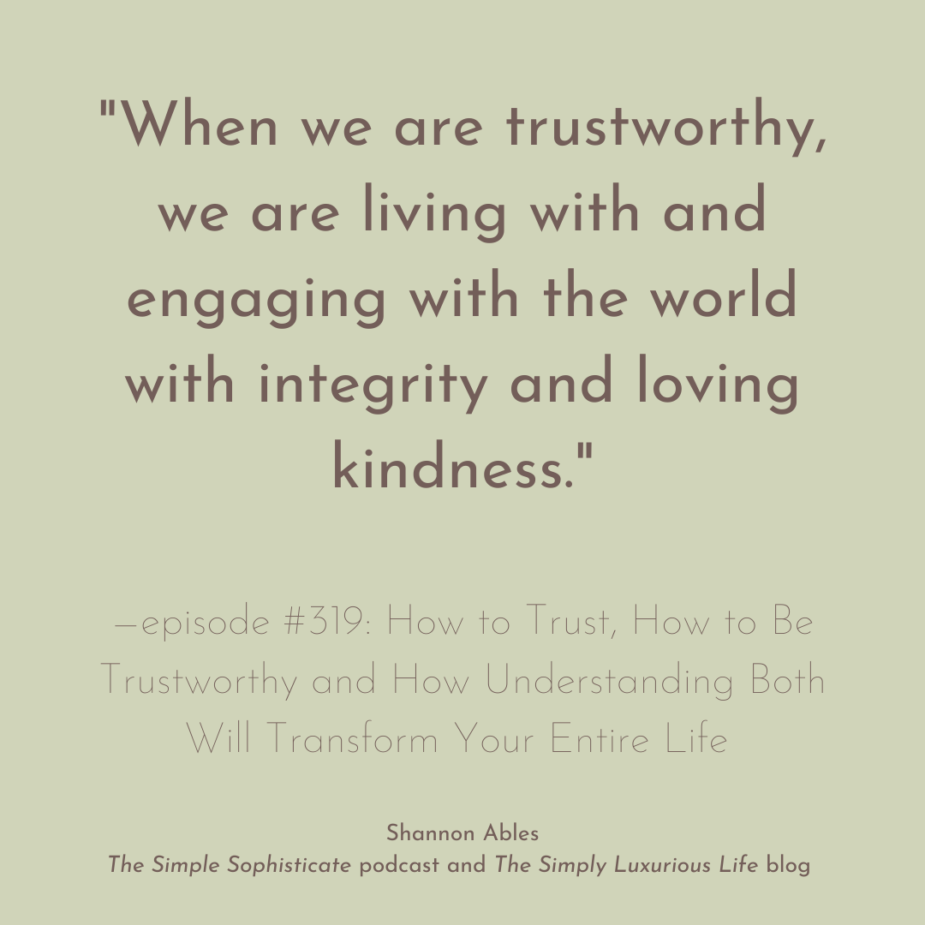 When we act with integrity, we may be rejected, we may even be laughed at, but because we are mature enough to understand how trust can be built with another, the opinions of those who reject or laugh or scoff matter less because we have strengthened our inner resources and know to walk away. We do not take revenge, retaliate or act in a way that is against our integrity, but instead engage with loving kindness. Richo shares this detailed list of the many ways you express loving kindness and integrity. Here is just a taste:
6. Build a full and healthy life: Rely on your partner for only 25% of your needs fulfillment It is not just a romantic partner we shouldn't rely on for more than 25% of our needs fulfillment but any one person. Why? If we remain in the child-parent trust model which is a survival approach, we are in a dependency-relationship which thwarts any attempt for a healthy, fulfilling relationship. Ironically, we are programmed to have our survival needs met - the child-parent model - but we must shift away from this comfort seeking and step into the challenge approach to living which requires that we become more comfortable with the unknown and cultivate more self-trust (we'll talk about this type of trust below). The shift occurs when we start seeking safety and security from within rather than outside of ourselves. When we make this shift, our world changes for the better. Our days and relationships more enriching and our contentment grounding. Richo shares a quote from Henry David Thoreau which I found quite succinct and accurate to describe what we seek in relationships, "I will come to you, my friend, when I no longer need you. Then you will find a palace, not an almshouse." So where does the rest of our need fulfillment come from if only 25% can come from any one person? It comes from the healthy social circle and self-care you have thoughtfully nurtured over time, and that doesn't just mean people. In this post, I share a list of different connections and relationships worth investing in and then in this post share the elements of a strong social well-being. Simply put, your friends, family, yes, even your pets, and of course your career, spiritual practice, Mother Nature and any other resource that strengthens your sense of safety and security make up the remaining 75% of your needs fulfillment. 7. Exercise, as well as be able to identify, the five A's In episode #287 - 5 Things to Do to Build Healthy Relationships, David Richo's first book How to Be An Adult in Relationships: The 5 Keys to Mindful Loving inspired the content. Detailing the five A's necessary to be exercised by both individuals in any mutually satisfying and fulfilling relationships, these 5 A's play a fundamental part in building trust. What are the A's?
We are being trustworthy when we express each of these in relationships. We know someone is worthy of being trusted when they exercise them in return. (read this post to explore each of the A's in more detail). 8. When we have self-trust, there is no need, or desire, to control others "The yes of surrender to the limits in our relationship leads to serenity, the safety and security that happen from within us. Such surrender is our proof to ourselves that we really can trust ourselves. We begin to redirect our trust, an empowering venture." An intimate relationship takes time to build as both involved have taken the time to show they are trustworthy. When we trust the other, we gradually and then more largely surrender, and surrendering is possible because we hold fast and steadily to strong trust of ourselves. The surrendering has as much to do with being with another human being as it has to do with letting our feelings be what they will be in the midst of all the experiences that will arise. And letting ourselves fully feel these feelings without suppression. I speak largely of the awesome feelings that we may have thought were never possible. We are more comfortable with surrender because we trust ourselves to respond rather than react, to speak up with assertiveness not aggression when our needs are not being met as well as knowing what our needs are and why because we have done the homework of ourselves as well as acknowledged that we are still growing and learning and evolving. Richo writes about men in American culture and how often when men deny or step away from the potential of a relationship with a real, healthy and secure individual, stating the reason is because they fear losing their freedom, it is actually an inaccurate reason. Let me explain. If the person they are stepping towards is indeed real, secure and has self-trust, then what men actually fear is not the loss of their freedom, but rather the feelings that may arise when they surrender themselves to what the relationship, what the intimacy, may actually be and who they will become when they surrender to the truth of what they feel. In other words, two self-trusting adults who exchange all of the 5 A's create a space, a life of fulfillment without controlling the other. Why? Because we are not forcing the other to be engaged with us. They want to be with us because we each find comfort, affirmation, love and community with each other. It feels good because it is good to feel our best, and if we feel our best with them, even when we unintentionally make mistakes or life trips us up, so long as we are acting with integrity and loving kindness, the intimacy remains and actually strengthens. Such strength in a relationship takes time to build, just as trust does and that is why true intimacy, true fulfillment, true love, takes time and is never at first sight. 9. Strengthen your core trust and become curious about your own life journey Essentially our core trust is acceptance in the reality of the world. A letting go, a trusting in magic and truth of things beyond our control. It doesn't mean we do not engage or act passively, but we do not strangle life. We let it unfold while dancing with it. When we exercise our core trust we "generate a calm abiding, a serenity that energizes. The opposite of being in control is resting secure and being alert to what comes next." "To open to reality is to turn toward it and to trust that it makes room for us in that very same moment . . . all this happens as we let go of control and stay with whatever happens until it transforms." Understanding what core trust is and how it can open up our lives was an aha moment for me. In many ways over the past 12 years I have been exercising a core trust even though I was doing so unconsciously. When we take our life experiences and mine them for wisdom rather than wallow in them and lament about how things may have been different, we are choosing to embrace our journey and figure out what is our calling, how can we marry what we are passionate about with what the world needs - our dharma as Jay Shetty calls it and in so doing, our journey unfolds in ways we could never have imagined. We are open to possibility and brave enough to explore the unknown while staying grounded in our self-trust - our boundaries maintained, our values held once questioned and evaluated to truly be our own. "When I give up trying to direct the show and instead keep opening to how it unfolds, I unfold." Richo reminds that "without core trust, we can't relax our grasp and let reality unfold as it needs to . . . with core trust, we gain confidence that nothing can happen to us that does not offer a fulfillment of our ineradicable yearning for wholeness. Thus everything in our lives, whether from events or from people, is just what is needed for our unique story to be told." How exciting is that! How freeing is that to know that it is in the letting go, engaging, but not demanding or manipulating, that we actually infuse our life with awesome possibility. 10. As your trust strengthens, your wisdom grows "Wisdom requires us to open to what happens and be discriminating about what we let in." As we come to understand what constitutes trust in someone else, as we explore our own feelings to accurately access what our needs are and why we are feeling what we are feeling, as we communicate with assertiveness paired with courtesy our needs, as we experience the walking away and opening up to new people, as our self-trust grows, as our core trust grows, we are better able to know who to begin letting into our lives and who to walk past. 11. Understand where the need to control originates "Our need to control is actually not a need; it is a panic that our needs will not be met unless we take full charge." Richo's explanation of the truth he states above prompted many lightbulb moments to go off in my own head. I found myself shaking my head in agreement, acknowledging the truth of my own desire to control in a variety of different instances in my life, and I felt grateful to finally have found his insights as they helped me better understand myself. The truth is, when we demand to control, we let go of the core trust we must have in order to live a life of fulfillment. The ego wins when we require something go exactly our way, and when the ego wins, we are relinquishing the belief in our own powers. We are far more capable than we acknowledge in such moments, and letting the ego win keeps us in a state of dependency rather than trust in the world around us and in ourselves. 12. The four directions we give our trust In today's episode so far we have talked about self-trust (#8) and core trust (#9), and now I would like to talk about the other two because once we have all four types of trust being exercised in our lives, the quality of our relationships and our experience of life, thus a life of fulfillment, elevates. When we exercise self-trust we become better able to determine who is trustworthy and who to continue to get to know in a variety of types of relationships. Exercising self-trust in this way ushers in the third type of trust - interpersonal trust.
As we nurture a variety of interpersonal relationships of trust, we make sure not to place more than 25% of our needs in any one relationship. We do so because we trust ourselves, we have a core trust and, to introduce the fourth type of trust, we have trust in a higher power. Do not jump to conclusions. A "higher power" as defined by Richo "can mean belief in a personal God or in any force or spirit in nature or the universe that transcends ego and can be relied upon for grace and support. In many ways, our core trust and trust in a higher power are one. Richo is not saying our destiny has already been pre-ordained or even that there is intervention by something we don't understand. No. What he is saying is that we can have "confidence that no power on earth can hold us captive to hate or prohibit us from loving." This does not require us to have faith in a literal God, but rather to understand something we cannot fully understand but have the courage to believe in the 'friendliness of the universe'. Richo goes on to talk about Grace-full Coincidence in his epilogue, further encouragement to each of us to let go, act with integrity and loving kindness in each of our days, be engaged with the world, but not demanding, and trust in something magical. He poses this question: Does the universe position things so carefully that our hearts can open at just the right time? What mysterious power makes it all come together just like that? Is it that friendly? How can we ever doubt that we can dare to trust? My immediate response and annotation in my book was, I hope so. And so I am consciously daring to trust, to open my heart to that possibility and take control of what I can, which is only myself and how I engage. Remembering to exercise the 5 A's, remove the stories from my mind and walk with patience and self-trust along with all of the other trusts, grateful for the gift of being here on this earth. I dare you to do the same and am confident your life journey will delight and amaze you when you do.
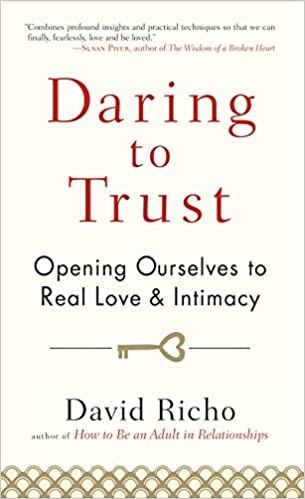 Explore the full book here.
Petit Plaisir —John Coltrane's Giant Steps album
~The Simple Sophisticate, episode #319~Subscribe to The Simple Sophisticate: iTunes | Stitcher | iHeartRadio | YouTube | Spotify | Amazon Music |
Sun, 5 December 2021
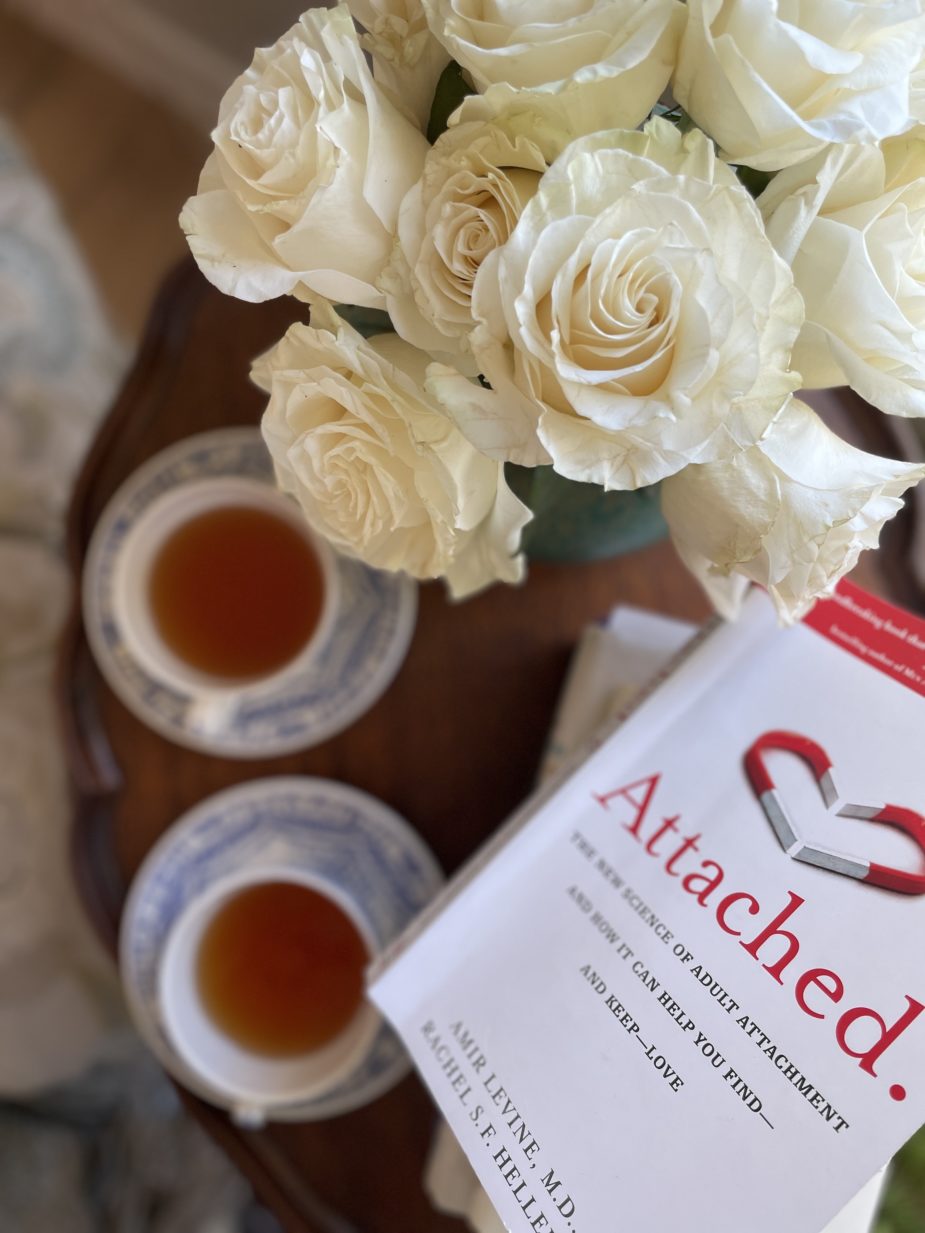 "If we feel secure, the world is at our feet. We can take risks, be creative, and pursue our dreams." —Amir Levine, M.D. and Rachel S.F. Heller, M.A., authors of Attached: The New Science of Adult Attachment and How It Can Help You Find—and Keep—Love Until we know the priceless gift of peace security in relationships of any type bring into our everydays, it can seem unfathomable to trust such peace is possible. On the flip-side, if all that we have ever known due to the good fortunate of our upbringing with secure, loving parents and community is a life and way of being that enables us to try, explore, and soar, then it isn't until we meet someone or try to engage with someone who is insecure that we realize the awesomeness of being secure in a relationship. During the height of the pandemic lockdowns, a book that was published in 2010 hit record sales as those in relationships sought advice on how to strengthen their relationships, those desiring a relationship inquired how to be and find and build a secure relationship and wherever else readers may have fallen on the continuum of wondering about relationships picked up the book Attached.: The new sequence of adult attachment and how it can help you find—and keep—love by Dr. Amir Levin and Rachel S.F. Heller. Without the tools or knowledge to understand what feeling and behaving in a secure way might be, we do our best to navigate the emotions that naturally arise when we take the risk of meeting someone knew and intertwining two different people's lives into one, yet hoping to ensure contentment for both. However, if we don't know ourselves well, don't know how to communicate clearly, yet kindly and without harm, and our partner doesn't either know themselves well or doesn't communicate effectively, how are we know what works for the two individuals involved? The good news for all of us is that having a Secure attachment style can be learned. We are not born with or without it. We are taught or modeled different attachment styles during childhood and then through adulthood; the key is to be aware and knowledgeable of each, and to acquire and practice the skills of being Secure. And as for seeking out a partner, become a secure adult enables to understand what is shown from those we consider entering into a relationship with so that we choose wisely and engage in a healthy manner to put the odds in our favor of finding and keeping a healthy, loving relationship. "Time and again, research shows that the best predictor of happiness in a relationship is a secure attachment style."
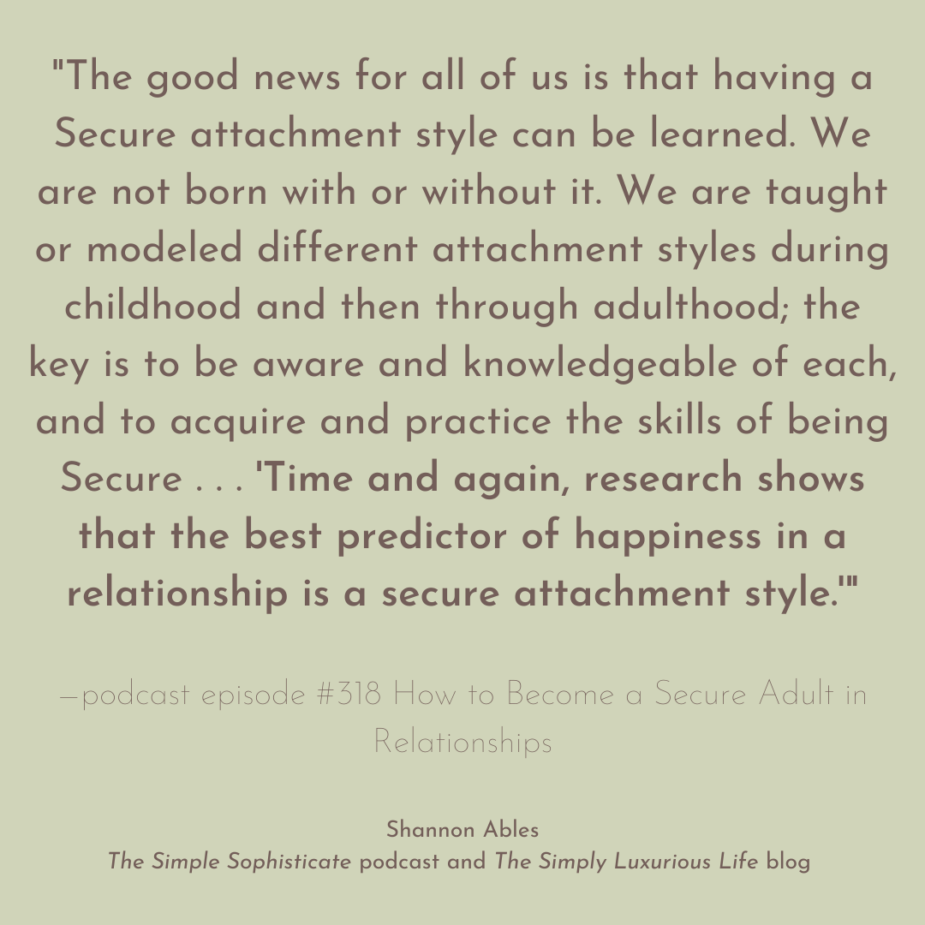 Benefits of being a secure individual in life and in relationships:
What are the characteristics of a secure individual? First, it is important to note that you cannot determine simply by looking at someone that they are secure. Simply because someone is friendly, likable and sociable does not mean they are secure. The author adamantly refutes the belief that a secure individual can be determined by their "charm, composure and/or self-confidence. As with other attachment styles, personality or physical traits won't give secures away. Secure people fit almost every description across the personality spectrum." But back to the question: what are the characteristics of a secure individual? "(1) They are programmed to expect their partners to be loving and responsive and (2) don't worry much about losing their partner's love. (3) They feel extremely comfortable with intimacy and closeness and (4) have an uncanny ability to communicate their needs and (5) respond to their partners' needs." I picked up the book early this fall after reading an article in The New York Times by Foster Kamer. While I had heard of the three, technically four different types of attachment styles, I had never deeply explored them to fully understand them. Of course, being, feeling and engaging with Secure attachment styles sounded to me to be a no-brainer, but I knew I didn't always fall into that category . . . and I wanted to. For the sake of my own well-being, but also for all relationships I was part of, especially an intimate, romantic relationship, I chose to pick up the book and become a student. Guessing how to be Secure didn't seem to me to be a recipe for success, so I chose to be a student, purchased the book, and have since read it three times, re-reading certain sections based on what I needed to more fully understand. Once I read the book I knew I wanted to bring it to listeners of the podcast and readers of TSLL blog, so today, I will be sharing 13 skills and insights for becoming a Secure adult in relationships. By no means is what I share with you today the full breadth and depth of what the book details, so I highly recommend, if this topic interests you, to pick up the book. Let's get started. ~Note to Readers: Be sure to tune in to the audio version as each point listed below is discussed in detail, content that is not included in the written post. 1. Understand the Dependency Paradox"Does [being programmed to connect with someone special] mean that in order to be happy in a relationship we need to be joined with our partner at the hip or give up other aspects of our life such as our careers or friends? Paradoxically, the opposite is true! It turns out that the ability to step into the world on our own often stems from the knowledge that there is someone beside us who we can count on—this is the "dependency paradox". (p. 29) "If you want to take the road to independence and happiness, find the right person to depend on and travel down it with that person. Once you understand this, you've grasped the essence of attachment theory." 2. Understand your current attachment style (it can change, it is not permanent)"Attachment styles are stable but plastic. Knowing your specific attachment profile will help you understand yourself better and guide you in your interactions with others. Ideally this will result in more happiness in your relationships." Know thyself. A common refrain here on TSLL blog and podcast, but the truth is you need to know where you are now in order to acquire the correct instructions to arrive at your desired destination. 3. Learn how to effectively communicate your needs - be clear and kind"[Secure individuals] are able to sensitively and empathetically—and most importantly, coherently—discuss their emotions". Speaking at someone is different than speaking with someone, and how we speak with someone will determine the potential for our needs to be heard. To speak with kindness is to be inoffensive and to "not put your partner on the spot". Use "I feel" statements or "I need" statements to express why you wish to share what you are sharing. The practice of effective communication stretches across all types of relationships and it is never too early or too late to start. Often our goal in communicating is to gain what we desire, but the truth is, we may not immediately gain what we desire, but we will at least become clear about who can or cannot be what we need or give us what we need. Of course, immediate actions from our partner, friend, child or boss doesn't mean they cannot or won't be able to as sometimes it takes time to process, to work on logistics, etc., but if you don't effectively and kindly communicate your needs, no one will know them. "Effective communication is the quickest, most direct way to determine whether your prospective partner will be able to meet your needs." 4. Don't play games5. Refrain from engaging in the 'relationship dance'Defined as 'one partner getting closer while the other steps back in order to maintain a certain distance in the relationship at all times', with a secure partner you don't step too closely too quickly, simply at a steady and reasonable pace that the two people involved feel comfortable moving. There is no rushing as there is a groundedness in one's self and a secure person is "comfortable with closeness" and isn't afraid to step forward once they know themselves and who they are stepping toward or someone they want to get to know better. This is not to say a secure person knows it will work out, but rather they have a sense of steady assurance in themselves and that what they give is real and worth exploring. ~Post to explore: 10 Ways to Strengthen Your Self-Worth 6. View "sex and emotional intimacy as one"Distance is created when the two are separated. Again, such a view speaks to the ability to be comfortable with closeness once both partners have been vulnerable beyond the bedroom as they get to know each other and are drawn to each other beyond the physical chemistry. 7. Responsive and expect it in return (remember, no games)Having communicated their needs and listening sincerely to their partner's needs, the reciprocity of responsiveness rather than dismissal strengthens the trust and intimate connection. 8. Be availablePhysically and emotionally being present for your partner is the action of a secure individual. When we communicate our needs and tend to them as well as observe our partner is responsive to our needs, we in turn are also showing up and making ourselves available. 9. Support without interference"Provide behind-the-scenes-support for [your partner's] endeavors." Allowing your partner to pursue what they are passionate about, helping without over-taking or taking the credit so that their gifts shine is the support of a secure individual. As a secure individual you are helping because you want to support your partner, yet are securely tending to your own passions and need no spotlight, need not be in control, rather only present to help as needed without being recognized by anyone other than your partner. 10. Understand there are many potential partners11. Don't feel a need to act defensively or punishIn other words, secure individuals can see a situation more objectively. They can effectively diffuse the conflict, observe in their partner what really provoked their outburst or anger, and not add fuel to the fire. 12. More likely to step into a healthy relationshipWe must keep in mind that a secure individual tends to be savvy in their partner selection. It doesn't mean if you are secure, you will always select a secure partner, but through clear and effective communication as the getting to know you phase unfolds, you can observe red flags early-on and find the right partner more easily. I didn't say quickly, but being secure does help you not step forward too far with someone who would not be the right person. 13. Expects to be treated with respect, dignity and loveDovetailing with #12, a secure person begins any relationship with effectively communicating their needs which is why knowing yourself highly benefits the ability to choose a partner to begin to get to know. The fundamental foundation piece for a healthy relationship is believing, yes, knowing, you are worthy of respect because you extend it in your everyday life. When you present yourself to a potential partner holding yourself in a space of self-respect, knowing you deserve to be treated with dignity and love, then you can quickly discern to whom to begin engaging with and whom to walk away from. Of course, even as this book points out, research findings change with hindsight, time and more examination, and it is never wise to take an entire book at face-value but rather to read with a critical mind and discerning objectivity. However, what I am confident you will find is that no matter what your relationship status when you apply the tools and skills explored and taught in this book, you will find a deeper peace and inner calm that you may not have had prior to including them in your life. After all, at the core of the definition of contentment is to find a peace within no matter what is swirling about outside of you. How we choose to engage, what we step forward toward and refrain from engaging in determines the quality of our lives, and if we apply the knowledge we have about ourselves and what we desire to cultivate in our everydays which absolutely, relationships play a significant role, we begin to realize the amazing gift we give ourselves when we become a secure adult.
Petit Plaisir —Winter Flower Bouquet with Ornamental Cabbages Click on the link above to learn more about how to arrange your own bouquet - so simple and quite inexpensive (under $20).
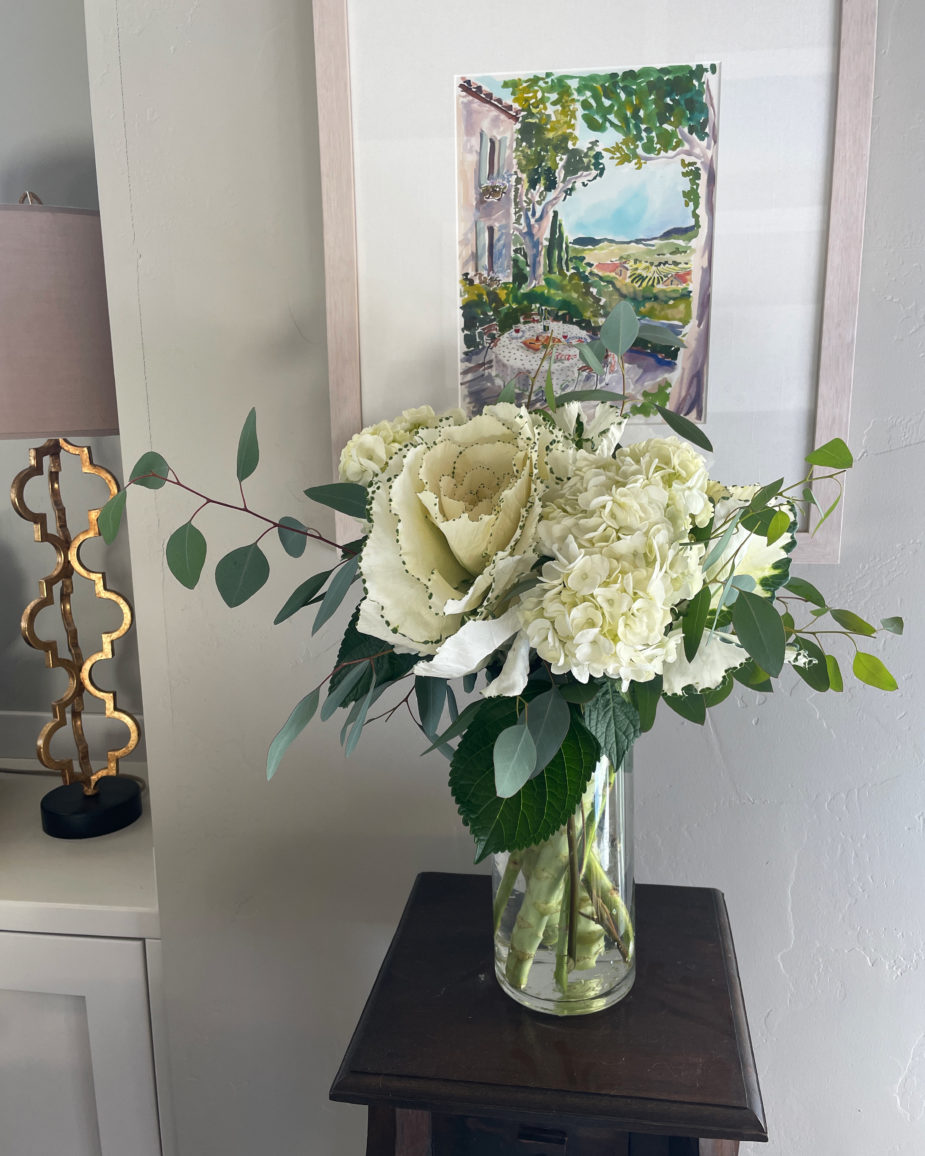
SIMILAR POSTS YOU MIGHT ENJOY
 5 Things to Do to Build Healthy Relationships, episode #287
~The Simple Sophisticate, episode #318~Subscribe to The Simple Sophisticate: iTunes | Stitcher | iHeartRadio | YouTube | Spotify | Amazon Music |
The Simple Sophisticate - Intelligent Living Paired with Signature Style

Categories
lifestylemoney
fashion
general
food
relationships
beauty
holidays
style
decor
etiquette
technology
dating
clothing
news
happiness
health
finances
self-help
feminism
french living
communication
inspiration
self-improvement
cooking
French-inspired
podcast
travel
entertaining
Archives
AprilMarch
February
January
December
November
October
September
August
July
June
May
April
March
February
January
December
November
October
September
August
July
June
May
April
March
February
January
December
November
October
September
August
June
May
April
March
February
January
December
November
October
September
August
July
June
May
April
March
February
January
December
November
October
September
August
July
June
May
March
February
January
December
November
October
September
August
July
June
May
April
March
February
January
December
November
October
September
August
July
June
May
April
March
February
January
December
November
October
September
August
July
June
May
April
March
February
January
December
November
October
September
August
July
June
May
April
March
February
January
December
November
October
September
August
| S | M | T | W | T | F | S |
|---|---|---|---|---|---|---|
| 1 | 2 | 3 | 4 | |||
| 5 | 6 | 7 | 8 | 9 | 10 | 11 |
| 12 | 13 | 14 | 15 | 16 | 17 | 18 |
| 19 | 20 | 21 | 22 | 23 | 24 | 25 |
| 26 | 27 | 28 | 29 | 30 | 31 | |
Syndication



